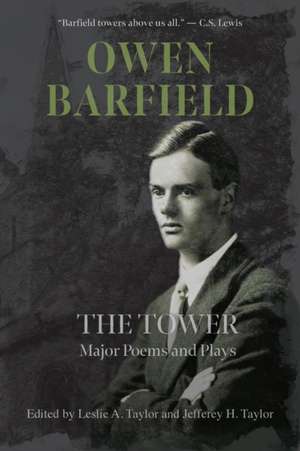The Tower
Autor Owen Barfield Editat de Jefferey H. Taylor, Leslie A. Tayloren Limba Engleză Paperback – 24 aug 2020
Despite the influence Barfield exerted on contemporary authors such as Howard Nemerov and Saul Bellow, the biggest gaps in the published corpus of the Philosopher of Poetry are most of the major poems and poetic dramas he wrote according to his theories that place poetics at the core of conscious experience itself. This current publication remedies this absence by presenting five striking literary pieces composed throughout Barfield's lifetime. The Tower, an introspective narrative poem, is the 'great work' of Barfield's youth; Medea, a mythopoeic drama, is seemingly his last major poetic and dramatic work. Between these two are the mythopoeic narrative poem Riders on Pegasus, a trilogy of Anthroposophical mystery plays Angels at Bay, and the light-hearted extended poem The Unicorn. Readers of Barfield's philosophical works and Inklings enthusiasts will find much to admire and enjoy in this volume.
About the Author
Owen Barfield (1898-1997) is one of the twentieth century's most original and influential literary figures.
As an author and philosopher, he rallied against 'positivism' and was instrumental in bringing about a new awareness of the spiritual world that would eventually result in the "New Age" movement. He lived to see with satisfaction how alternative ways of thinking have begun to transform the limited positivist mindset.
Early on, Barfield developed his theory of 'The Evolution of Consciousness', based on an understanding of imagination as the highest human ability, "as a vessel by which divinity passes down into humanity."
His fellow Inklings C.S. Lewis and J.R.R. Tolkien are among the leading figures influenced by Barfield's work. Tolkien's linguistic and literary philosophy were influenced by Barfield's theories. For Lewis, he was a life-long friend and creative partner. Indeed, Owen Barfield was 'Romanticism' personified.
About the Editors
Leslie A. Taylor (PhD, Southern Illinois University, 1997) is an independent scholar who specializes in Classical and Renaissance Literature. She has published on the Greek and Hebrew translations of Boethius's De consolatione philosophiae and has co-authored with Jefferey H. Taylor a book on the influence of Boethius on Milton's Paradise Lost.
Jefferey H. Taylor (PhD, Southern Illinois University, 1994) is a Professor of English at Metropolitan State University of Denver. He is author of Four Levels of Meaning in the York Cycle of Mystery Plays and has published on the Dutch and Hebrew translations of Boethius. Dr. Taylor is recipient of the 2016 Owen Barfield Award for Excellence.
Preț: 232.79 lei
Nou
Puncte Express: 349
Preț estimativ în valută:
44.55€ • 47.63$ • 37.14£
44.55€ • 47.63$ • 37.14£
Carte tipărită la comandă
Livrare economică 17 aprilie-01 mai
Preluare comenzi: 021 569.72.76
Specificații
ISBN-13: 9781643171722
ISBN-10: 1643171720
Pagini: 330
Dimensiuni: 152 x 229 x 20 mm
Greutate: 0.49 kg
Editura: Parlor Press
ISBN-10: 1643171720
Pagini: 330
Dimensiuni: 152 x 229 x 20 mm
Greutate: 0.49 kg
Editura: Parlor Press
Notă biografică
Owen Barfield (1898-1997) is one of the twentieth century's most original and influential literary figures. As an author and philosopher, he rallied against 'positivism' and was instrumental in bringing about a new awareness of the spiritual world that would eventually result in the "New Age" movement. He lived to see with satisfaction how alternative ways of thinking have begun to transform the limited positivist mindset. Early on, Barfield developed his theory of 'The Evolution of Consciousness', based on an understanding of imagination as the highest human ability, "as a vessel by which divinity passes down into humanity." His fellow Inklings C.S. Lewis and J.R.R. Tolkien are among the leading figures influenced by Barfield's work. Tolkien's linguistic and literary philosophy were influenced by Barfield's theories. For Lewis, he was a life-long friend and creative partner. Indeed, Owen Barfield was 'Romanticism' personified.
